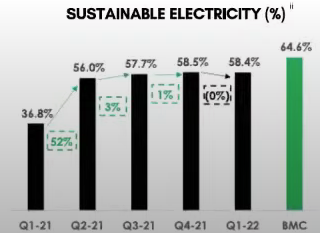At our ESG fund, as part of our due diligence on Bitcoin Mining, we recently examined the 7 Most common ESG arguments against Bitcoin and found all of them to be untrue. Sometimes, the diametric opposite was the truth.
1 Bitcoin competes with other users like residential users, hospitals, industry
Not true. One beauty of #Bitcoin is that there is an in-built disincentive not to compete. More users on the grid mean more expensive electricity. So when demand spikes, Bitcoin miners either voluntarily stop mining, or have pre-agreements with grid operators that taper power consumption down 99%.
2 “Helping stabilize grids sounds all well in theory but there’s no evidence of that actually happening”
Not true. Lots of evidence of this working. Here’s one from earlier this year where Bitcoin miners helped Texas avoid the rolling blackouts of Feb ‘21. Check out the video.
3. Bitcoin uses a large, exponentially growing amount of energy per transaction
Misinformation. Bitcoin energy usage does not come from its transactions. Using the layer-2 lightning network it can scale to handle more transactions than VISA per second while using less energy than VISA per second. What’s exponentially growing is the capacity of the lightning network, not energy use.
4. “Bitcoin loves fossil fuels”
The exact opposite is true. Bitcoin is the world’s most progressive industry both in net renewable energy used (58.4%) and renewable energy growth rate (up 59% from Q1 ‘21). The predominant fossil fuel that new Bitcoin miners mine is leaking methane. This removes a GHG that is tens of times more warming than CO2.

5. “No bitcoin miners are using 100% renewable”
Already 8 use 100% renewables, growing fast. (GridShare, CyberianMine, Lancium, Blockstream/Block /Tesla, Dametech, Soluna Holdings, Bitfarms, Gryphon Mining, Hive Blockchain, DMG Blockchain + a mining outfit using 100% Volcanic energy in El Salvador). Many are now going carbon negative. Others have aggressive targets to get there. They’ve done this in a little over a decade. Few if any other industries have progressed so far, in such a compressed timeframe.
6 “Using more energy is bad, we need to use less energy”.
Not so. The growing consensus espoused in Saul Griffith’s book “Electrify Everything” is that we need to
- Clean up electricity (supply)
- Electrify everything (demand)
Ie: less fossil-fuel energy, way more electrical energy (and combusting leaking methane)
More EVs and electric heating is critical (demand). Bitcoin helps that grid be renewable-based (see next tweet).
7. “I have never heard how Bitcoin can help build out the renewable grid”
Here’s the summary: The bottleneck to VRE (variable renewables – solar & wind) exponential growth is that grid operators only approve 1 in 6 VRE applications. That’s because
- The VRE projects haven’t found a committed financier. Financiers haven’t backed them because they can’t make money without a grid connection, only get profitable in year3 and don’t have a first customer. #BTC Mining solves 3-in-1: a first customer that doesn’t need a grid connection, and starts paying immediately (not after a 2-year grid interconnection wait)
You can read how this works in my 13 April 2022 Twitter post
Or in this Whitepaper from ARKInvest
b. they don’t get approval is that variable renewable energy adds load balancing headaches for grid operators. Bitcoin mining together with battery technology solves much of this load balancing headache. Here’s how.
Original Twitter Post: 23 May 2022
1/
— Daniel Batten (@DSBatten) May 23, 2022
At our #ESG ClimateTech fund, as part of our due diligence on #bitcoinmining, we examined the 7 Most #ESG arguments against #Bitcoin.
We expected to find a mixture of some true, some false, some grey
We were surprised to find all 7 were false. No grey areas
Here's the list
